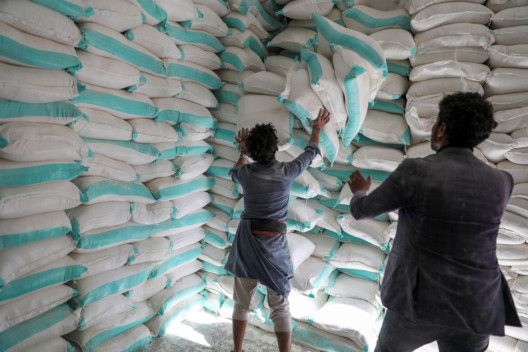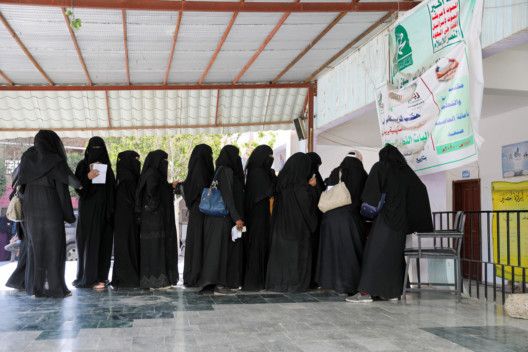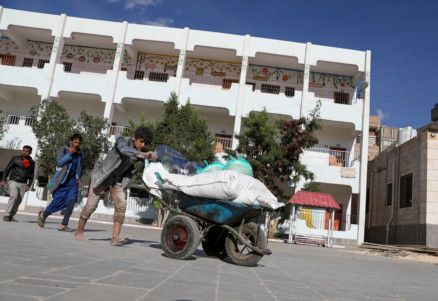
New York: Yemen’s Al Houthi militiamen have blocked half of the United Nations’ aid delivery programmes in the war-torn country – a strong-arm tactic to force the agency to give them greater control over the massive humanitarian campaign, along with a cut of billions of dollars in foreign assistance, according to aid officials and internal documents obtained by The Associated Press.
The group has made granting access to areas under their control contingent on a flurry of conditions that aid agencies reject, in part because it would give Al Houthis greater sway over who receives aid, documents and interviews show.
Al Houthis’ obstruction has hindered several programmes that feed the near-starving population and help those displaced by the nearly 6-year civil war, a senior UN official said, speaking on condition of anonymity to discuss the situation.
“Over 2 million beneficiaries ... are directly affected,” the official said.
Al Houthis have been pushing back against UN efforts to tighten monitoring of some $370 million a year that its agencies already give to government institutions controlled mostly by the rebel group, documents show. That money is supposed to pay salaries and other administration costs, but more than a third of the money spent last year wasn’t audited, according to an internal document leaked to the AP.
The UN has largely kept quiet in public about the pressure, but behind the scenes the agency and international donors are digging in against Al Houthi demands. The AP spoke to seven workers and officials from UN and independent agencies about the situation. All spoke on condition of anonymity for fear of reprisals. The AP also saw dozens of documents, including emails of aid officials.
In October, the UN humanitarian coordinator for Yemen, Lise Grande, sent a letter to Al Houthi-appointed “prime minister” complaining about a long list of demands.
The “overwhelming majority” of them impede or delay delivery of aid and many violate humanitarian principles, she said in the letter, a copy of which was obtained by the AP.
2% cut
For months, Al Houthis demanded a 2 per cent cut from the entire aid budget be given to them, a condition the UN and donors rejected. In an email to the AP, a spokesperson for the US Agency for International Development said Al Houthi attempts “to implement a tax on humanitarian assistance are unacceptable and directly contradict international humanitarian principles.” The United States donated $686 million to Yemen in 2019, according to USAID.
Last week, Al Houthis appeared to back off the 2 per cent demand, but continue to press for other concessions, according to aid officials.
During a meeting in Brussels last Thursday, aid agencies and international donors threatened to reduce aid if Al Houthis continue to impose restrictions on UN operations in Yemen.
The situation “has reached a breaking point,” they said in a statement.
At least one agency, the World Food Programme, is currently considering cutting back the monthly food aid it delivers to 12 million Yemenis every other month, a UN official said. “It’s unfortunate that people will suffer but this is on the Houthis,” the official said. “They can’t use people as hostages for too long.”
On Thursday, both UN and American officials said they are continuing their efforts to deliver aid to Yemenis despite Al Houthi roadblocks.
“We want to help the long-suffering people of Yemen,” said USAID Administrator Mark Green, when asked about the AP investigation during a stop in Munich. “Al Houthis are putting up restrictions that make it difficult to do that, and that’s something that we refuse to stand still for.”
Especially challenging situation
UN deputy spokesman Farhan Haq added: “We’ve made clear to all parties the need to make sure that our aid can proceed, and we have regularly reiterated the importance of sustaining the humanitarian operation, which is being implemented in challenging conditions and is providing life-saving assistance to millions of Yemenis.”
Al Houthis’ demands have stoked longtime concerns among aid agencies over the rebels’ diverting of humanitarian funds and supplies into their own or their supporters’ pockets or toward their war effort.
Delivering aid in a war zone has always posed a problem for UN agencies. But officials said the situation in Yemen has been especially challenging.
Al Houthis have withheld visas and permissions for equipment and supplies and refused to grant clearances for UN missions to move through rebel-controlled areas. Aid workers said agency leaders’ past willingness to concede to some of the rebels’ demands has emboldened Al Houthi leaders to push for more.
Nearly 300,000 pregnant and nursing mothers and children under age 5 haven’t received nutrition supplements for more than six months because Al Houthis “held beneficiaries hostage to the 2 per cent” demand, another UN official said.
In another example, Al Houthis for months delayed permission to distribute 2,000 tons of food – enough to feed 160,000 people – in the district of Aslam, where the AP previously found starving villagers reduced to eating boiled leaves. When approval came in November, the food had spoiled “beyond the point of salvage,” another aid official said.
Al Houthi leaders have remained defiant in the face of UN pushback.
“Yemen will survive” if agencies suspend aid, Abdul-Mohsen Tawoos, secretary-general of Al Houthi agency coordinating international aid, told European donors during a January 20 Skype call. Minutes of the call were obtained by the AP.
He said Al Houthis wanted to reach an agreement with the UN and its donors, but “won’t be bullied.”
The UN’s massive aid programme, totaling $8.35 billion since 2015, is vital to keeping many Yemenis alive. The UN calls the situation in Yemen the world’s worst humanitarian crisis.
Ten million people in the country are on the brink of famine and 80 per cent of the population of 29 million in need of aid, according to the U.N.
More than 3 million people have been displaced, cholera epidemics have killed hundreds, and at least 2.2 million children under 5 suffer from severe malnutrition, the agency said.
The UN received around $3 billion in 2019 in international donations for its campaign, short of its $4.2 billion goal. Al Houthi demand for 2 per cent of that budget would funnel $60-$80 million into the coffers of their aid-coordination agency, the Supreme Council for Management and Coordination of Humanitarian Affairs and International Cooperation, known as SCMCHA.

Harassment, intimidation and suspected embezzling of funds by Al Houthis have been going on for years, aid workers said, and have gotten worse since the rebels created their aid coordination agency in early 2018. Since then, Al Houthi-led security agencies have arrested local workers, blocked aid missions or held up supplies, according to internal emails and documents seen by the AP.
“Not even a simple project can be carried out in northern Yemen without the consent and supervision of this body,” said a Yemeni chief of a local aid organization.
The UN rarely pushed back, calculating that aid had to be delivered at any cost.
UN agencies continued to put hundreds of millions of dollars into Al Houthi accounts for “capacity building,” a common practice in humanitarian programs to ensure government bodies function.

Some of the money went to salaries for doctors, teachers and other vital employees who have otherwise gone without pay amid the war. Millions more went to Al Houthi aid agency for administrative costs and salaries.
Aid workers privately expressed concerns about the funds from UN aid agencies being diverted into the coffers of Al Houthi leaders or their supporters.
Unicef told the AP in a statement that its funds were strictly monitored and no instances of diversions were found. The World Health Organisation said all its spending was “subject to internal and external audit,” as well as frequent internal reviews on multiple levels. WHO also said it found no evidence that its funds have been diverted.
Still, last summer, the UN requested all agencies report how much they were giving in direct cash transfers. In 2019, the total reached $370 million, around 10 per cent of the entire international aid budget for Yemen, according to a UN spreadsheet obtained by the AP. Around $133 million was marked in the spreadsheet as “not audited.”
Some officials in Al Houthi aid body, SCMCHA, appear to be receiving multiple salaries, the data shows. For a time, three UN agencies were each giving salaries to the body’s president, his deputy and general managers. Each of the officials received a total of $10,000 a month from the agencies, the spreadsheet shows.
The UN refugee agency also gave SCMCHA $1 million every three months for office rental and administrative costs, while the UN migration agency gave the office another $200,000 for furniture and fibre optics.
UN officials said Grande was “genuinely shocked when she learned about the arrangements.”












